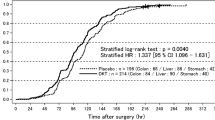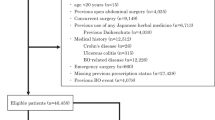Abstract
Background
The Japan Society for Oriental Medicine makes a compilation of structured abstracts of randomized controlled trials (RCTs) of Kampo medicines available on its Evidence Reports of Kampo Treatment (EKAT) website.
Methods
Using EKAT, we conducted a systematic review and meta-analysis on the efficacy of using daikenchuto (https://mpdb.nibiohn.go.jp/stork) for bowel dysfunction after surgery for gastrointestinal cancer. The primary outcomes were the time to first postoperative flatus and the time to first postoperative bowel movement (BM).
Results
We found nine relevant RCTs. The mean differences between the daikenchuto group and control group (daikenchuto was not administered) were − 0.43 (95% CI: − 0.77 to − 0.09) days for the time to first postoperative flatus, − 0.29 (95% CI: − 0.59 to 0.01) days for the time to first postoperative BM, and − 0.95 (95% CI: − 1.70 to − 0.21) days for the length of postoperative hospital stay, and the risk ratio of the incidence of intestinal obstruction was 0.60 (95% CI: 0.35–1.03). The time to first postoperative flatus and the length of postoperative hospital stay were significantly shorter in the daikenchuto group than those in the control group (P = 0.01). However, only double-blind studies were evaluated; the results turned to be non-significant.
Conclusion
As a result of meta-analysis by all retrieved according to the registered protocol, daikenchuto was efficacious in improving postoperative bowel dysfunction in patients with gastrointestinal cancers. However, limiting to articles with description of COI and blindness, significance disappeared.












Similar content being viewed by others
References
Motoo Y, Seki T, Tsutani K (2011) Traditional Japanese medicine, Kampo: its history and current status. Chin J Integr Med 17:85–87
EBM in Kampo 2002, Interim Report (2002). Kampo Medicine 53(5 supplementary issue)
Evidence Reports of Kampo Treatment (2005). Kampo Medicine 56 (EBM supplementary issue)
Nunome S, Sasaki H (1999) The history of dai-kenchu-to and the component crude drugs (in Japanese). Jpn J Orient Med 50:413–437
Hoshino N, Ganeko R, Hida K et al (2017) Goshajinkigan for reducing chemotherapy-induced peripheral neuropathy: a systematic review and meta-analysis. Int J Clin Oncol 23:434–442
Kuriyama A, Endo K (2018) Goshajinkigan for prevention of chemotherapy-induced peripheral neuropathy: a systematic review and meta-analysis. Support Care Cancer 26:1051–1059
Ishizuka M, Shibuya N, Nagata H et al (2017) Perioperative administration of traditional Japanese herbal medicine daikenchuto relieves postoperative ileus in patients undergoing surgery for gastrointestinal cancer: a systematic review and meta-analysis. Anticancer Res 37:5967–5974
Moher D, Liberati A, Tetzlaff J et al (2009) Preferred reporting items for systematic reviews and meta-analyses: the PRISMA statement. J Clin Epidemiol 62:1006–1012
Zhang L, Cheng Y, Li H et al (2018) Meta-analysis of randomized controlled trials on the efficacy of daikenchuto on improving intestinal dysfunction after abdominal surgery. Ann Surg Treat Res 95:7–15
Shamseer L, Moher D, Clarke M et al (2015) Preferred reporting items for systematic review and meta-analysis protocols (PRISMA-P) 2015: elaboration and explanation. BMJ (Clin Res ed) 350:g7647. https://doi.org/10.1136/bmj.g7647
Higgins J, Green SP, Cochrane C (2008) Cochrane handbook for systematic reviews of interventions. Wiley, Hoboken
Nishino T, Yoshida T, Goto M et al (2017) The effects of the herbal medicine daikenchuto (TJ-100) after esophageal cancer resection, open-label, randomized controlled trial. Esophagus 15:75–82
Akamaru Y, Takahashi T, Nishida T et al (2015) Effects of daikenchuto, a Japanese herb, on intestinal motility after total gastrectomy: a prospective randomized trial. J gastrointest Surg 19:467–472
Yoshikawa K, Shimada M, Wakabayashi G et al (2015) Effect of daikenchuto, a traditional Japanese herbal medicine, after total gastrectomy for gastric cancer: a multicenter, randomized, double-blind, placebo-controlled, phase II trial. J Am Coll Surg 221:571–578
Takagi K, Nagata H, Horie T et al (2007) Effects of prophylactic Kampo therapy with daikenchuto on bowel disorder following colorectal cancer resection: prospective randomized study (in Japanese). Prog Kampo Med 429:2–3
Fujii S (2011) Effects of daikenchuto on early postoperative bowel motility following surgery for colorectal cancer (in Japanese). Prog Med 31:468–469
Yoshikawa K, Shimada M, Nishioka M et al (2012) The effects of the Kampo medicine (Japanese herbal medicine) “Daikenchuto” on the surgical inflammatory response following laparoscopic colorectal resection. Surg Today 42:646–651
Yaegashi M, Otsuka K, Itabashi T et al (2014) Daikenchuto stimulates colonic motility after laparoscopic-assisted colectomy. Hepatogastroenterology 61:85–89
Katsuno H, Maeda K, Kaiho T et al (2015) Clinical efficacy of daikenchuto for gastrointestinal dysfunction following colon surgery: a randomized, double-blind, multicenter, placebo-controlled study (JFMC39-0902). Jpn J Clin Oncol 45:650–656
Katsuno H, Maeda K, Ohya M et al (2016) Clinical pharmacology of daikenchuto assessed by transit analysis using radiopaque markers in patients with colon cancer undergoing open surgery: a multicenter double-blind randomized placebo-controlled study (JFMC39-0902 additional study). J Gastroenterol 51:222–229
Donner A, Klar N (2002) Issues in the meta-analysis of cluster randomized trials. Stat Med 21:2971–2980
Boeckxstaens GE, de Jonge WJ (2009) Neuroimmune mechanisms in postoperative ileus. Gut 58:1300–1311
Kono T, Shimada M, Yamamoto M et al (2015) Complementary and synergistic therapeutic effects of compounds found in Kampo medicine: analysis of daikenchuto. Front Pharmacol 6:159. https://doi.org/10.3389/fphar.2015.00159
Satoh Y, Itoh H, Takeyama M (2010) Daikenchuto raises plasma levels of motilin in cancer patients with morphine-induced constipation. J Tradit Med 27:115–121
Kikuchi D, Shibata C, Imoto H et al (2013) Intragastric dai-kenchu-to, a Japanese herbal medicine, stimulates colonic motility via transient receptor potential cation channel subfamily V member 1 in dogs. Tohoku J Exp Med 230:197–204
Kono T, Koseki T, Chiba S et al (2008) Colonic vascular conductance increased by daikenchuto via calcitonin gene-related peptide and receptor-activity modifying protein 1. J Surg Res 150:78–84
Kono T, Kaneko A, Hira Y et al (2010) Anti-colitis and -adhesion effects of daikenchuto via endogenous adrenomedullin enhancement in Crohn’s disease mouse model. J Crohn’s Colitis 4:161–170
Yasunaga H, Miyata H, Horiguchi H et al (2011) Effect of the Japanese herbal kampo medicine dai-kenchu-to on postoperative adhesive small bowel obstruction requiring long-tube decompression: a propensity score analysis. Evid Based Complement Altern Med 2011:264289. https://doi.org/10.1155/2011/264289
Acknowledgements
We would like to express our gratitude to Dr. Kiichiro Tsutani (Faculty of Health Sciences, Tokyo Ariake University of Medical and Health Sciences) for general instruction and Dr. Aya Hirata (Department of Preventive Medicine and Public Health, Keio University School of Medicine) for the evaluation of articles. We also sincerely thank the authors for kindly providing us with the important data. The present study was supported by the Japan Agency for Medical Research and Development (AMED) Research Project for Improving Quality in Healthcare and Collecting Scientific Evidence on Integrative Medicine, Grant number: JP16lk0310023. The authors thank all respondents in this study.
Author information
Authors and Affiliations
Contributions
All the authors have contributed to this article. MH, IA, TN and YM contributed to the conception and design of this research; MH, YI, TI, YS, TN, YM, TN and YM evaluated articles; MH and TN contributed to statistical analysis and interpretation of data.
Corresponding author
Ethics declarations
Conflict of interest
The authors declare no competing interests.
Additional information
Publisher's Note
Springer Nature remains neutral with regard to jurisdictional claims in published maps and institutional affiliations.
About this article
Cite this article
Hosaka, M., Arai, I., Ishiura, Y. et al. Efficacy of daikenchuto, a traditional Japanese Kampo medicine, for postoperative intestinal dysfunction in patients with gastrointestinal cancers: meta-analysis. Int J Clin Oncol 24, 1385–1396 (2019). https://doi.org/10.1007/s10147-019-01502-1
Received:
Accepted:
Published:
Issue Date:
DOI: https://doi.org/10.1007/s10147-019-01502-1




